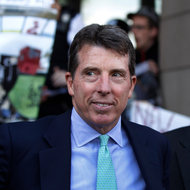 Lefteris Pitarakis/Associated PressRobert E. Diamond Jr., who resigned as chief of Barclays last week, said the Bank of England knew of the rate discrepancies.
Lefteris Pitarakis/Associated PressRobert E. Diamond Jr., who resigned as chief of Barclays last week, said the Bank of England knew of the rate discrepancies.
Robert E. Diamond Jr., the former chief executive of Barclays, will forgo deferred stock bonuses of up to $31 million, as the British bank looks to quell public anger over an interest rate-rigging scandal.
The bank’s chairman, Marcus Agius, told a British parliamentary committee on Tuesday that Mr. Diamond would still receive up to one year in salary and a cash payment worth a combined $3.1 million. Mr. Diamond, who resigned last week as Barclays battled public furor over its illegal actions, will “support the transition to the new chief executive as necessary,” the bank said on Monday. Mr. Diamond had already agreed to forfeit his annual cash bonus.
“It is my hope that my decision to step down and today’s agreement on my remuneration will help close this chapter and allow Barclays to move forward and prosper,” Mr. Diamond said in the statement.
Related Links
Details of the pay package trickled out at the parliamentary committee hearing on Tuesday as British politicians scrutinized Mr. Agius, questioning whether he was a competent chairman. The committee struck a hostile tone, hammering away at Mr. Agius, who has also agreed to resign in wake of the scandal.
The committee also homed in on Mr. Diamond’s leadership of the bank and whether the former chief executive was fully forthcoming when he testified last week.
Last month, Barclays agreed to pay $450 million to settle accusations that it had attempted to manipulate a key interest rate known as the London interbank offered rate, or Libor, which is based on surveys from banks about the rates at which they could borrow money in the financial markets. The rate serves as a benchmark for the pricing of $350 trillion of financial products, including credit cards, mortgages and student loans.
The Barclays settlement with the Commodity Futures Trading Commission, Justice Department and Financial Services Authority of Britain exposed how the bank improperly influenced Libor to deflect concerns about its health and bolster profits.
The Barclays case, part of a broader investigation into how many of the world’s biggest banks set key interest rates, set off a firestorm in London that is now spreading to the United States. Several American banks, including JPMorgan Chase and Citigroup, are also under scrutiny for their suspected role in the case.
In a statement on Tuesday, Mr. Agius said: “The Board deeply regrets the circumstances that led to Bob resigning his positions at Barclays. Despite having no personal culpability, he recognizes more than anyone the negative attention that they have generated and has taken characteristically strong action to address that. These circumstances do not detract in any way from the tremendous legacy that Bob has left at Barclays, and his actions are clear indications of his commitment to the institution to which he has contributed so much.”
Article source: http://dealbook.nytimes.com/2012/07/10/diamond-to-forgo-unvested-deferred-bonuses-at-barclays/?partner=rss&emc=rss